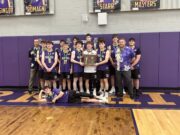Hiram – Hiram College students and local farmers had the opportunity to meet Joel Salatin, who the New York Times called, “the high priest of the pasture,” and “Virginia’s most multi-faceted agrarian since Thomas Jefferson”. Salatin raises livestock free of potentially harmful chemicals on his Polyface Farm in Swoope, Virginia. He was thrust into the public eye when he and his farm were profiled in the book entitled, The Omnivore’s Dilemma, by Michael Pollan as well as two subsequent documentaries titled, Food, Inc., and Fresh.
“Indeed, I’m having the time of my life,” states Salatin, in his book, The Sheer Ecstasy of being a Lunatic Farmer. “Earthworms dance in my fields. Pigs fully express their pigness. Eggmobiles sanitize the fields. Enthusiastic young people work and learn. Cows practice their mob stocking herbivorous solar conversion lignified carbon sequestration fertilization. It’s ballet in the pasture. It’s sheer ecstasy.”
Salatin considers his farming a ministry, and condemns the negative impact of increased regulations imposed by the US Government. Salatin now spends a hundred days a year lecturing at colleges and to environmental groups, which is why he visited Hiram College recently. In Salatin’s time in our area, he spoke at two very different events. The first event was an invitation-only event for about 50 people. The audience consisted of local farmers and producers, who were treated to a slide show of specifics of operations on Salatin’s Polyface Farms.
Local business owners, including Auburn Twin Oaks Vineyard co-owner and manager, Beth Schabel, were anxious to hear him speak. “I was introduced to him through the documentaries Food, Incorporated and Fresh,” stated Schabel. “I grew up ‘walking the beans’ as a kid in Iowa, like most teen-agers,” referring to a summer job of walking between rows of soybeans, pulling out weeds that competed for nutrients. “When I went back to Iowa years later, no one did this anymore, and I wondered why,” stated Schabel. She found her answer, in part, through finding out more about Joel Salatin.
Salatin spoke about the negative impact chemical companies and factory farms have on agriculture. He contrasted those principles to the more basic ideas he favors, like “grazing management,” that enables him to produce and deliver chemical-free livestock products to more than 5,000 families, 10 retail outlets, and 50 local restaurants.
He explained how his family uses composting techniques to improve the soil on his family-run farm. The improved soil grows a “salad bar” of fescue, timothy, clover, dandelions, and more. Salatin then uses temporary electric fencing to move his 100+ head of cattle daily to a fresh new paddock, allowing cows to graze on more mature, more starch-rich forage. This process increases the health of his herd, while allowing him to feed hay roughly one-third as many days per year as similarly sized operations.
Salatin’s methods mimic nature, as his eggmobiles — predator-proof mobile poultry pens — follow the cows. Inside the mobile coops, hens or turkeys scratch through cow manure, eating bugs and helping the dung decompose into the soil. In addition, the birds eat bugs and forage weeds, converting them to nutrient-rich eggs.
But his practices aren’t just limited to open fields. At Polyface Farm, pigs are “finished” using traditional pig-forest symbiosis, where the disturbance they create while searching for nuts and acorns freshens the forest floor, allowing more diversified plants to germinate. Their rooting builds up the forest soil by breaking down leaf litter, and protects trees from harmful bugs.
During the small gathering, guests had the opportunity to view a slideshow of these practices, and to ask questions about his farming practices. Later that evening, Salatin gave an hour-long talk to a packed house of students and community members in the Hayden Auditorium, highlighting the ideas behind his new book titled, Folks, This Ain’t Normal: A Farmer’s Advice for Happier Hens, Healthier People, and a Better World. He has authored seven books about farming and ecological issues. Find out more at www.polyfacefarms.com.











